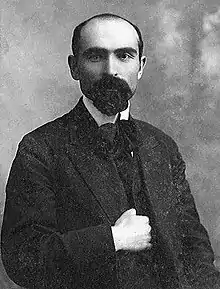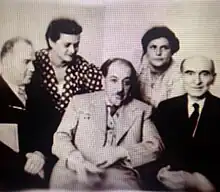Derenik Demirchian
Derenik Karapeti Demirchian (Armenian: Դերենիկ Կարապետի Դեմիրճյան) was a Soviet and Armenian writer, novelist, poet, translator and playwright.
Derenik Demirchian | |
|---|---|
 | |
| Born | February 18, 1877 Akhalkalaki, Russian Empire |
| Died | December 6, 1956 (aged 79) Yerevan, Armenian SSR, Soviet Union |
| Occupation | Poet, novelist, translator and playwright |
| Nationality | Armenian |
| Citizenship | Russian Empire, Soviet Union |
| Education | Gevorgian Seminary, Nersisian School |
| Alma mater | University of Geneva |
| Period | 1890s-1956 |
| Notable works | Vardanank, "Nazar the Brave" |
| Notable awards | Order of Lenin, Order of the Red Banner of Labour |
| Children | Vahe |
Biography

Demirchian was born on February 18, 1877, in Akhalkalaki in the region of Javakheti (Javakhk in Armenian) in southern Georgia, then a part of the Russian Empire. After completing his schooling in Tiflis, he became a member of the Armenian literary group Vernatun, so named because its members met in the 5th floor residence of poet Hovhannes Tumanian. Demirchian published his first book of poetry in 1899. He attended the University of Geneva from 1905 to 1909, and then after some years in Tiflis, settled in Yerevan in 1925. During the 1920s several of his plays were produced, most notably Nazar the Brave, a rags to riches comedy about a folkloric figure which is based on a collation of over 60 sources by the poet Tumanian. Described by Demirchian as a play for “childlike adults and adultlike children,” Nazar the Brave was first performed in 1924. It was subsequently given professional productions in Yerevan, Tiflis and Baku, made into an opera and later a film (1940). From the mid-1920s, in addition to writing plays, Demirchian began writing and publishing in other prose genres, including short stories, novels, and children’s stories. His most notable work is Vardanank (parts 1 and 2, 1943–46, 2nd ed., 1951), a monumental patriotic novel dedicated to the 5th century Armenian liberation war.[1] He was also known as a translator from Russian into Armenian; his translation of Nikolai Gogol’s Dead Souls is especially esteemed. Demirchian continued to work and publish until his death in 1956. In 1980, the Derenik Demirchian State literary prize for prose was established in Soviet Armenia. The Derenik Demirchian House-Museum has operated since 1977 in Yerevan, in the house where the writer lived from 1929 to 1956.
He was recognized as a supporter of people's rights. He is the author of "Hayreni yerkir" (1939), "Mesrop Mashtots" (1956) and other books. He was elected to the Academy of Sciences of the Armenian SSR in 1953.
Derenik is buried at Yerevan's Central Cemetery [2]
Vardananq
The novel Vardanank is based on historical events of the 5th century - the Armenian Liberation War, historically known as the "war of Vardanank" (the war of Vardan Mamikonian and his men).
It is written in a bright language that includes historically colorful images of St Vardan's associates, and a realistic picture of the life of Persian and Byzantine ruling circles.[3]
Plays
- Nazar the Brave (Քաջ Նազար), 1912
- Vasak, 1914
- National Disgrace (Ազգային Խայտառակություն), 1919
- Judgement (Դատաստան), 1922
- The Song of Victorious Love (Հաղթական Սիրո Երգը), 1927
- Phosphoric Ray (Ֆոսֆորային Շող), 1932
- Captain (Կապիտան), 1938
- Fatherland (Երկիր Հայրենի), 1941
- Wealthy Hovhannes (Մեծատուն Հովհաննես)
- Napoleon Korkotyan
- Comrades (Ընկերները)
References
- Derenik Demirchian at the Great Soviet Encyclopedia
- Demirchian memorial tombstone at Yerevan Central Cemetery (Tokhmakh)
- "Vardanank". Archived from the original on 2011-08-31. Retrieved 2008-01-04.